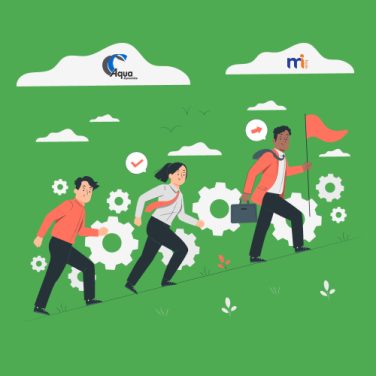In the ever-evolving landscape of small business management, HR workflow automation plays a pivotal role in transforming traditional HR operations into efficient, streamlined processes.
HR workflow automation involves integrating technology into everyday HR tasks to minimise manual intervention and maximise productivity. This not only saves time but also significantly reduces the likelihood of human error, ensuring that processes such as payroll, employee data management, and compliance are handled accurately and promptly.
For small businesses, where every resource counts, including time and staff, HR workflow automation offers a clear competitive edge.
It allows teams to focus on more strategic tasks by automating routine activities like time tracking, payroll processing, and leave management. Such efficiencies in HR management not just ensure operational smoothness but also contribute to overall employee satisfaction by providing self-service options and quick approvals.
The competitive market today demands businesses to be agile and efficient. Small enterprises often face challenges with limited resources compared to larger corporations. HR workflow automation addresses these challenges by offering scalable solutions that cater to the precise needs of smaller teams without compromising on functionality.
Leveraging solutions like those offered by MiHCM, which integrate seamlessly within existing systems, small businesses can unlock a new realm of operational efficiency. By automating HR tasks, MiHCM provides comprehensive solutions, from payroll management to employee lifecycle management, empowering small business owners to focus on growth and innovation.
Automate to innovate: Revolutionising small business payroll
For small businesses, HR workflow automation is not just about efficiency; it’s a game-changer that reduces the administrative burden and delivers strategic benefits.
By automating repetitive tasks, small businesses can transform how they manage payroll, leading to significant time savings and accuracy improvements. As a result, HR teams are freed to focus on more innovative tasks that can drive business growth.
When manual errors in payroll calculations are eliminated, businesses can operate with increased confidence. Automation ensures that administrative processes, such as tax filings and payroll reporting, are performed accurately and timely.
This not only aligns with regulatory compliance but also mitigates the risk of penalties associated with late or incorrect filing – a common concern for small businesses.
- Reduction in administrative burden: By handling routine tasks like payroll calculations and employee time tracking automatically, businesses can significantly reduce paperwork and manual interventions, freeing up resources for growth-related initiatives.
- Enhanced compliance: Automated systems maintain adherence to local labour laws by accurately managing payroll taxes and providing timely updates, thus avoiding costly compliance issues that could impact small business operations.
- Improved employee satisfaction: With automation, employee requests such as leave applications and payroll queries are handled swiftly through self-service portals, leading to increased satisfaction and engagement.
Implementing a solution like MiHCM can help enhance these benefits. MiHCM’s workflow technology streamlines HR tasks through automated scheduling, reporting, and employee management.
With its features like efficient HR requests and approvals and streamlined HR operations, MiHCM ensures that HR departments can operate smoothly with minimal effort. Automated workflows mean that small businesses can handle thousands of HR requests efficiently, contributing to happier employees and faster approvals.
As small businesses adopt HR workflow automation, they can unlock considerable improvements in HR operations, enhancing productivity across the board.
Solutions like MiHCM support global payroll management while providing comprehensive data for decision-making, making them perfectly suited for modern HR needs. By choosing automation, businesses not only innovate their payroll management practices but also bolster their competitiveness and agility in a demanding market.
- Identify critical HR processes for automation: The first fundamental step for any small business aiming to enhance its HR efficiency is pinpointing which HR functions would benefit the most from automation. This involves evaluating current operations and determining where manual burdens are greatest, such as in payroll processing, benefits administration, and compliance tracking. Once identified, these areas can be prioritised for automation to maximise time saving and reduce human errors.
- Engage with vendors offering customisable solutions: Partnering with reliable technology vendors is crucial for a successful implementation of HR workflow automation. Vendors like MiHCM provide extensive features tailored to small businesses, such as payroll systems integration, employee self-service portals, and HR analytics. Engaging with these providers allows small businesses to gain access to solutions that can be adapted to their specific needs, ensuring seamless workflow integration.
- Test solutions in pilot environments: Before fully integrating HR automation tools into a business’s daily operations, it’s prudent to conduct pilot tests. This allows businesses to evaluate the effectiveness of the chosen solutions and make necessary adjustments based on real-world feedback. It also helps ensure that systems are fully understood by the HR team and that any unforeseen challenges can be addressed before full-scale implementation.
For small businesses looking to streamline their HR functions, employing a well-rounded approach to implement HR workflow automation can be transformative.
By focusing on customisable solutions, such as those offered by MiHCM, businesses can ensure their payroll systems are set up efficiently, while simultaneously empowering their workforce with greater access to information and services.
Accuracy is key: Leveraging automation for payroll precision
Efficiency in payroll operations is a cornerstone for any small business striving for operational excellence. HR workflow automation ensures that payroll procedures are executed with unparalleled precision, mitigating errors associated with manual processing.
Automated systems handle complex payroll calculations that include salary, bonuses, deductions, and taxes with accuracy beyond manual capabilities, reflecting the true essence of efficient payroll management.
When systems are automated, data consistency and transparency are significantly enhanced. Automation integrates seamlessly with existing payroll systems, ensuring data is not only consistent across platforms but also readily available for in-depth analysis. This integration is pivotal for small businesses as it supports data-driven HR decisions and helps maintain compliance with local labour laws.
Automated payroll processes bring about a level of reliability as they are less susceptible to human errors, resulting in on-time salary payments and improved employee satisfaction.
Businesses leveraging workflow automation often report:
- Reduced risk of payroll errors: Automated calculations eliminate human error, ensuring employees are paid correctly and on time.
- Timely payments: Scheduled automations create a rhythm of punctual payments, crucial for maintaining workforce morale and trust.
- Seamless integration: Integrating solutions like MiHCM supports consistent data flows and full visibility into payroll operations.
For small businesses, customised automation tools provided by vendors like MiHCM are invaluable. They enable the automation of not just payroll, but entire HR processes, including attendance and time management. The advanced analytics features offered by MiHCM empower businesses to make informed decisions based on accurate and timely HR insights.
Incorporating workflow automation into payroll operations isn’t just about keeping pace with technology; it’s about leveraging that technology to enhance operational precision and business efficiency. By embracing platforms like MiHCM, small businesses can unlock enhanced productivity and ensure their HR and payroll systems operate smoothly.
By choosing the right solution, companies can enhance payroll accuracy, ensure compliance, and foster a productive work environment. For example, businesses that implemented MiHCM Lite discovered a drastic reduction in payroll processing times, allowing HR teams to redirect focus towards strategic growth initiatives.
MiHCM’s offerings, including analytics, help firms make data-driven decisions that improve employee performance and retention. The importance of seamless integration shows that combining systems without disruption improves operational efficiencies and business outcomes.
Ultimately, understanding the nuances of each HR and payroll solution – whether it be their integration capabilities, geographical reach, or pricing models – ensures that small businesses choose a tool that aligns efficiently with their operational goals and budget constraints.
Embrace the future: Take your HR to the next level
The landscape of HR management has been irrevocably transformed by workflow automation, particularly for small businesses.
Tools like MiHCM provide a seamless integration of various HR functions, offering comprehensive solutions that are specifically tailored for small businesses. These tools do not only support global payroll management but also equip HR departments with data-driven insights for better decision-making.
The ability to offer self-service options through platforms like MiHCM enhances the employee experience, promoting satisfaction and efficiency across all levels of the organisation.
As the market becomes increasingly competitive, staying ahead requires embracing these advanced technologies.
Small businesses can leverage HR workflow automation to streamline operations, which can unlock workforce productivity and facilitate compliance with local labour laws. Automation also ensures more strategic allocation of resources, allowing small teams to focus on growth-oriented tasks without being bogged down by routine administrative duties.
The future is about connectivity and efficiency in HR practices. By adopting automation tools like MiHCM, small businesses can transform their HR departments into robust, agile units that contribute significantly to the company’s overall success.
Essentially, embracing HR workflow automation is a strategic move that can help small businesses not only meet contemporary operational demands but also prepare for future challenges and opportunities.



